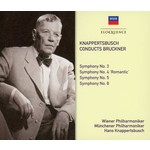
Hans Knappertsbusch: The Decca & Westminster Bruckner Recordings
 $40.00
Out of Stock
$40.00
Out of Stock6+ weeks add to cart
ANTON BRUCKNER
Hans Knappertsbusch: The Decca & Westminster Bruckner Recordings
Wiener Philharmoniker, Münchener Philharmoniker [No 8], Hans Knappertsbusch
[ Decca Australian Eloquence / 4 CD Box Set ]
Release Date: Friday 7 February 2020
This item is currently out of stock. It may take 6 or more weeks to obtain from when you place your order as this is a specialist product.
Newly remastered and gathered under one roof for the first time, the Decca recordings of Hans Knappertsbusch conducting Bruckner: a legendary combination.
For record collectors in the 1950s and 60s, the names of Bruckner and Knappertsbusch ('Kna') were practically synonymous. At a time when the composer's symphonies were routinely compared to Gothic cathedrals, the rough grandeur, steady pulse and towering climaxes of these readings marked out the conductor as an architect of symphonic majesty.
Record companies did not have to work hard to cultivate this image, thanks to Knappertsbusch's craggy visage, imposing presence on the podium and decades of Wagnerian experience at Bayreuth. At a time when Wagner's Parsifal was still experienced as a primarily sacred music drama, the major works of Bruckner were likewise understood in semi-sacred terms as concert-hall rites, and who better to pierce their mysteries than Parsifal's pre-eminent interpreter?
Knappertsbusch began recording Bruckner for Decca in 1954, with the Third. The Fourth and Fifth quickly followed, also from Vienna, and then the Eighth arrived as an appendix from Munich, first issued on the Westminster label in 1963. By then the conductor's readings of Romantic repertoire had become less impulsive, even more monumental in concept, but still lightened by a natural feeling for the dance rhythms in Bruckner's scherzos and Ländler themes.
Knappertsbusch persisted in conducting from editions prepared by Bruckner's pupils, notably the Schalk brothers, with their liberal re-scorings and cuts, to the finales in particular - all outlined in a perceptive booklet essay by Antony Hodgson. In the light of recent scholarship and a more nuanced perspective on Bruckner's evolving intentions with the composing and revising of his symphonies, these performances gain a certain, compelling authenticity of their own. No Brucknerian can afford to be without them.
"Very enjoyable … magnificent recording" Gramophone (No. 4)
"This may be of the old school and unfashionable, but it's unbeatable" BBC Music Magazine (No. 8)
"These studio recordings, although all previously available, are here newly remastered and gathered by Australian Decca Eloquence in one bargain set for the first time, thereby making a package irresistible to the Bruckner aficionado. The recordings of the first two symphonies here are monophonic but in good quality mono. An excellent introductory essay by Antony Hodgson successfully identifies and clarifies the features of the now widely-scorned editions of the symphonies Knappertsbusch performed. He steadfastly resisted adopting new versions of the scores edited by such as Haas as they appeared and ignored the 1955 Nowak edition of the Eighth in favour of continuing to use the 1892 Schalk version as performed by Richter in the premiere. The consensus as I understand it among those convinced of Kna's wizardry in this music is that we just have to let go of any regrets and enjoy what we have; certainly I rarely find my mind wandering into the consideration of textual variants when listening to his recordings; rather, I am soon under his spell and swept along by his mastery." MusicWeb
Tracks:
Symphony No. 3 in D minor
Symphony No. 4 in E flat major 'Romantic'
Symphony No. 5 in B flat major
Symphony No. 8 in C minor